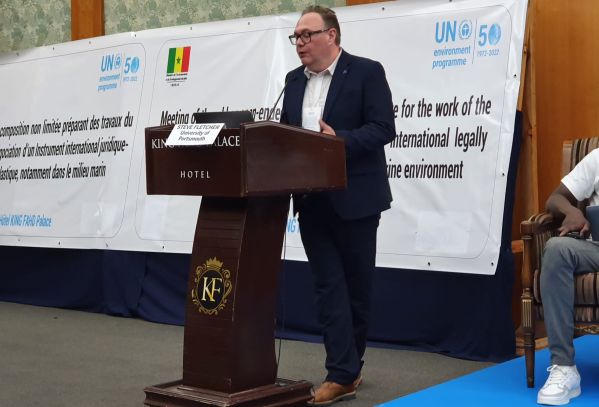Global Plastics Treaty Starting the Process in Senegal

A globally coordinated approach is vital to end plastic pollution.
A globally coordinated approach is vital to end plastic pollution. That’s the message made by Professor Steve Fletcher, Director of the Global Plastic Policy Centre at the University of Portsmouth, to delegates at the first UNEP meeting to develop an international, legally binding instrument to end plastic pollution.
The three day in person meeting in Senegal was introduced by Inger Anderson, Executive Director of UNEP yesterday – 29 May 2022. Ms Anderson opened the meeting by explaining the importance of all stakeholders working together to find the best solutions to plastic pollution and stressed the critical role of science in informing discussions.
Professor Fletcher and Dr Keiron Roberts shared findings by the University of Portsmouth’s Global Plastics Policy Centre. They focused on the need for a systemic approach to tackling plastic pollution.
“We all know that plastic pollution is a global problem. We have spent at least a decade putting in place policies to try and tackle it.” Professor Steve Fletcher, Director of the Global Plastic Policy Centre at the University of Portsmouth
Professor Fletcher said: “We all know that plastic pollution is a global problem. We have spent at least a decade putting in place policies to try and tackle it. These have often been fragmented and isolated, focusing on an individual product or a particular part of the plastics life cycle. Even if individual countries each implement brilliant policies, it doesn’t solve the problems because the challenges are international in their nature.
“Through our research at the Global Plastics Policy Centre, we have assessed over 100 plastic policies from around the world. It is clear that the only way to end the plastic pollution problem is for all stakeholders to work together. Too often countries, governments, and industry work in isolation therefore the commitment to develop a legally binding agreement on plastic pollution has come at just the right time – it is a significant step forward. I am looking forward to supporting the process in any way I can.”
“The commitment to develop a legally binding agreement on plastic pollution has come at just the right time – it is a significant step forward.” Professor Steve Fletcher, Director of the Global Plastic Policy Centre at the University of Portsmouth
The meeting has been organised to initiate the process to develop a global treaty to end plastic pollution and to engage with important stakeholders involved in the plastics industry, some of whom are rarely heard in international negotiations. Delegates will hear first-hand from Senegal residents like Adja Mame Seyni Diop who began picking waste at age 11. She still does this work and is also a spokeswoman for an association of waste-pickers at the Mbeubeuss dump.
Governments, civil society organisations, NGOs, research institutions, and the private sector are all encouraged to attend the three-day meeting. World leaders now have until 2024 to negotiate and agree to a treaty that will tackle the global plastic pollution crisis.